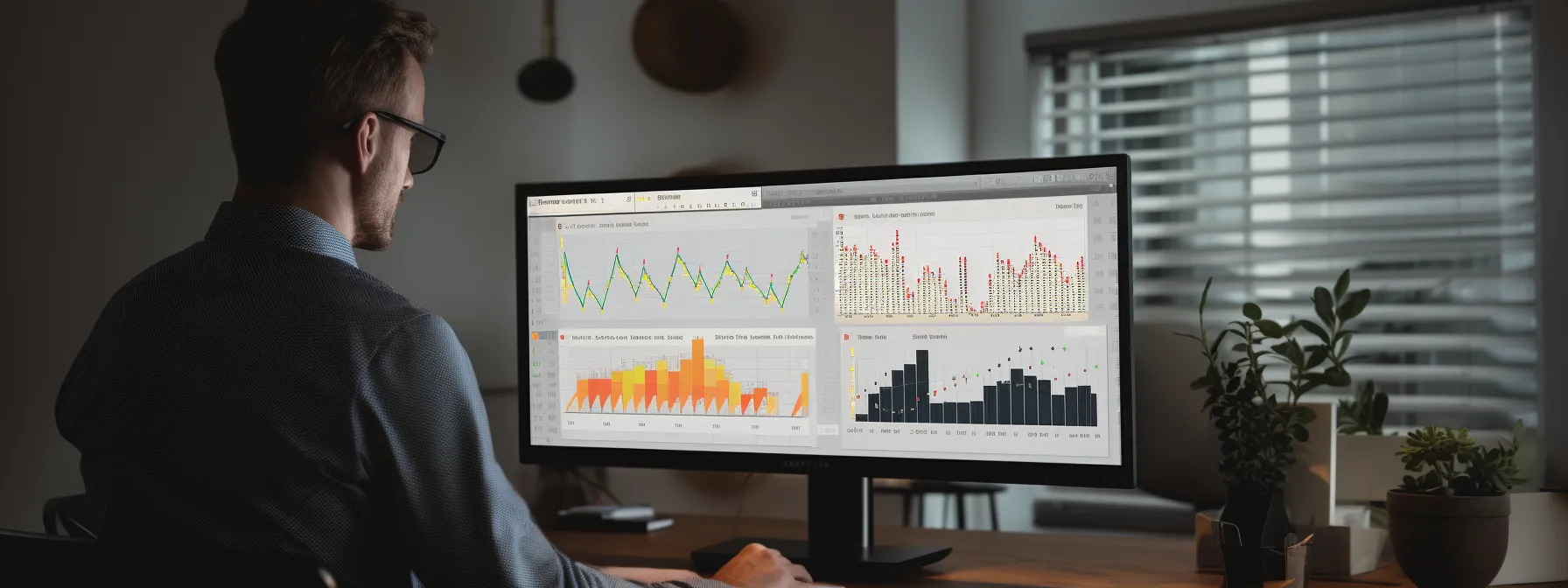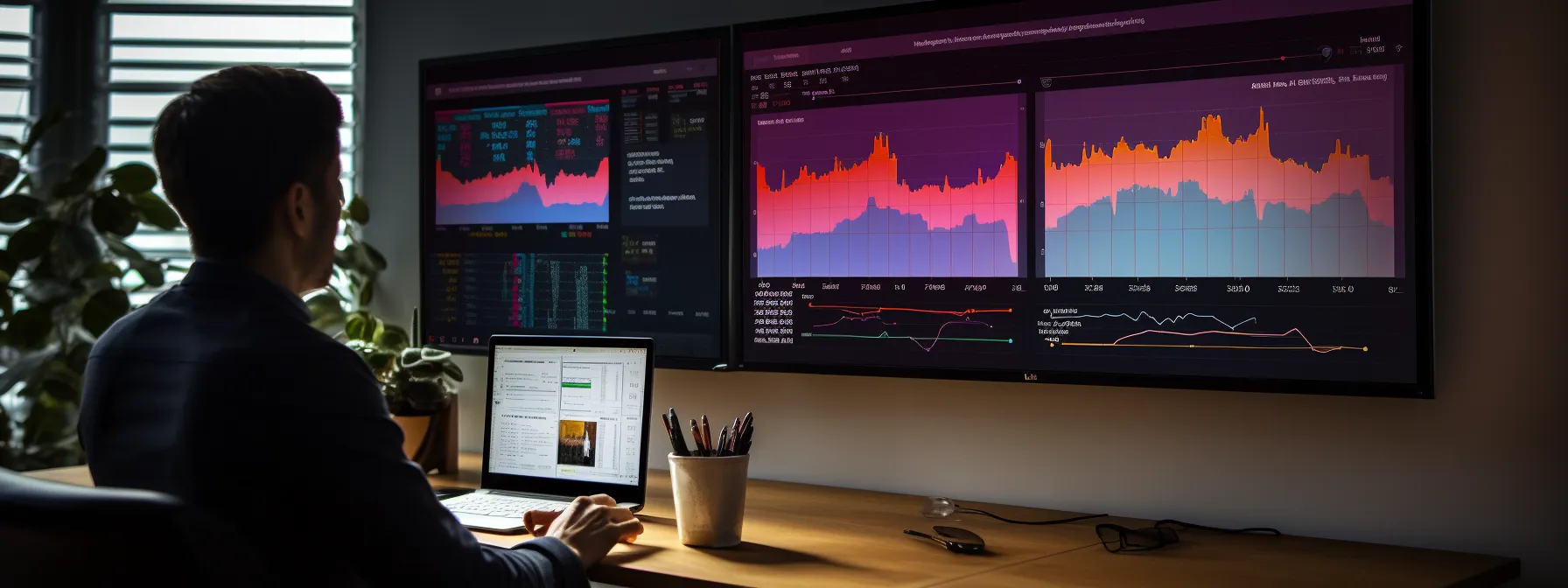Mastering Advanced SEO Reporting Techniques for Insightful Analytics
In the dynamic landscape of search engine optimization, mastering advanced SEO reporting techniques is pivotal for professionals eager to enhance their analytical acumen and strategic decision-making.
With a myriad of data at their fingertips, SEO practitioners must craft a reporting framework that not only harnesses the power of tools like Google Analytics and Search Console but also distills complex datasets into actionable insights.
The ability to visualize performance metrics and interpret user behavior unveils opportunities for fine-tuning marketing campaigns and attaining competitive advantage.
To unlock the full potential of SEO reporting, one must delve into user-centric analytics and leverage automation for efficiency.
Keep reading to discover how these advanced techniques can transform your SEO reporting into a cornerstone of your marketing efforts.
Key Takeaways
- Establishing clear objectives and selecting the appropriate key performance indicators (KPIs) are crucial for effective SEO reporting
- Integrating advanced tools like Google Data Studio and Search Console into SEO reporting allows for comprehensive analysis and optimization of search performance
- Customizing reports and dashboards with relevant SEO metrics helps showcase the impact of SEO strategies on business outcomes
- Analyzing user behavior through user flow, behavior reports, and site speed reports enables marketers to enhance content strategies and user experience
- Monitoring and analyzing backlink data is essential for understanding a website’s authority and trustworthiness, and for devising strategic link-building efforts
Crafting the Ultimate SEO Reporting Framework

In an age where data prevails as the underpinning for strategic decision-making, mastering advanced SEO reporting techniques has become indispensable for digital marketing professionals.
A meticulously structured SEO reporting framework serves as a cog in understanding the efficacy of a website’s performance related to search engine optimization.
Essential to this endeavor is delineating core objectives, formulating precise key performance indicators, selecting the most appropriate reporting tools, and designing a report structure that promotes transparency and actionable insight.
This form of intelligence gathering empowers marketers to fine-tune their strategies, ensuring each SEO initiative aligns with the overarching goals of driving traffic, enhancing customer experience, and ultimately contributing to the revenue trajectory of an online entity.
Elevate Your Visibility: Unlock SEO Success Today!
Identify Core Objectives for SEO Reporting
Establishing clear and precise objectives remains at the heart of successful SEO reporting. These goals must reflect the unique needs of the business, whether that entails tracking the progress of keyword rankings, monitoring traffic growth, deciphering user behavior, or measuring conversion rates.
By pinpointing these objectives upfront, SEO professionals set the stage for meaningful analysis, ensuring that subsequent reporting directly addresses the questions most pertinent to the business’s online performance and marketing efficacy.
Establish Key Performance Indicators (KPIs)
Before diving into the complexity of SEO metric analysis, it is essential for an SEO professional to establish a suite of Key Performance Indicators (KPIs) relevant to their marketing campaigns. KPIs such as organic sessions, keyword rankings, backlink quality, and page load time serve as quantifiable benchmarks that reflect the effectiveness of applied SEO techniques.
These indicators, when carefully chosen, not only reveal the health of an SEO strategy but also anchor the report’s narrative around outcomes that directly correlate to the business’s objectives. It is the meticulous tracking of these KPIs that allows professionals to gain a granular understanding of campaign successes or needs for optimization.
Choose the Right SEO Reporting Tools
Selecting the optimal assortment of SEO reporting tools is a critical component that empowers marketing teams to distill complex datasets into actionable intelligence. Advanced platforms, like Google Data Studio (GDS), offer a fusion of adaptability and comprehensive analysis, generating custom reports that cater to the intricate needs of SEO campaigns and underscore the granular nuances of web analytics.
With the integration of tools such as Universal Analytics and Google Tag Manager, marketers gain the capacity to amalgamate data from various sources, providing a multifaceted view of a campaign’s performance. This enables the synthesis of diverse data points, facilitating a comprehensive evaluation of the customer journey, from initial touchpoints on social media platforms to the final goal completion on landing pages.
Develop a Report Structure for Clarity
Devising a report structure that is both coherent and streamlined is essential for conveying complex SEO metrics in an understandable manner. The layout should be designed to present data in a logical sequence, highlighting the relationship between various SEO metrics and their impact on broader marketing goals.
An effective report structure facilitates a narrative that seamlessly translates the intricacies of SEO into comprehensible terms, allowing stakeholders to discern the precise contributions of search engine optimization activities to the overall business impact. By doing so, marketing professionals foster a clear and concise dialogue around analytics and actionable insights.
Integrating Google Analytics for in-Depth SEO Data

As the pursuit of robust search engine optimization (SEO) strategies intensifies, the role of Google Analytics emerges as a cornerstone in deciphering the wealth of data that informs and guides marketing efforts.
This powerful analytics tool extends beyond mere tracking, offering SEO professionals the capability to configure goals and event tracking meticulously tailored to the nuances of their campaigns.
By harnessing the advanced segments and custom report features of Google Analytics, marketers are equipped to segment their data, revealing the subtleties and trends necessary for refined analysis.
These functionalities unlock profound insights into the performance of SEO campaigns, enhancing the precision and effectiveness of marketing strategies.
Set Up Goals and Event Tracking in Google Analytics
Within the framework of Google Analytics, goals and event tracking constitute a sophisticated mechanism by which SEO professionals monitor specific user interactions. Establishing goals allows for the observation of critical conversions, such as form submissions or ecommerce transactions, affording a clear view of how users ultimately engage with web pages.
Event tracking delves deeper, granting the capacity to capture metrics on user behaviors that do not equate to a pageview, such as downloads, video plays, or clicks on outbound links. By implementing event tracking, marketers acquire a refined lens through which to assess the interactions that contribute to the customer’s journey and influence key marketing decisions.
Implement Advanced Segments for Refined Data Analysis
Advanced segments in Google Analytics equip SEO professionals with the ability to dissect their datasets with precision, isolating specific subsets of traffic to analyze intricate patterns and relationships. This fine-tuned approach to data analysis is pivotal in understanding diverse user behaviors and creating tailored marketing tactics for distinct audience segments.
By employing advanced segments, marketing teams unlock the capacity for a deep dive into various traffic sources, user demographics, and behaviors within a set date range. This level of granularity in SEO data analysis is instrumental in crafting strategic initiatives that resonate with targeted personas, ultimately fostering a more nuanced and effective customer experience.
Utilize Google Analytics Custom Reports for SEO Insights
Custom reports in Google Analytics afford SEO professionals with a dynamic canvas to illustrate the narrative of their SEO efforts and impact. By tailoring reports to focus on specific SEO metrics, they can showcase the elements most crucial for their unique business objectives and marketing strategies.
| SEO Metric | Insight Gained | Impact on Strategy |
|---|---|---|
| Organic Session Growth | Trends in traffic acquisition over time | Refinement of content and keyword strategy |
| Bounce Rate | User engagement and page relevancy | Enhancements to user experience and onsite optimization |
| Conversion Rate | Efficacy of CTAs and user journey flow | Optimization of landing pages and funnel approach |
Moreover, through the strategic utilization of custom reports, professionals gain the ability to align their SEO report structure with the company’s revenue attribution model. This alignment enables a direct correlation between SEO initiatives and business outcomes, quantifying the return on investment of SEO activities with greater precision and clarity.
Leveraging Search Console for SEO Reporting Success

In the realm of search engine optimization, the effective use of Search Console presents itself as an invaluable asset for SEO professionals seeking to refine their understanding of search performance.
With its robust capabilities, this tool allows for a comprehensive analysis of search performance data, aids in monitoring index coverage to maintain website health, and assists in identifying enhancements or issues that may impact SEO.
The integration of Search Console into advanced SEO reporting is a testament to its diagnostic utility in fostering informed strategies that elevate a website’s search engine visibility and performance.
Analyze Search Performance Data
Incorporating Search Console data into SEO reporting allows practitioners to dissect the components of search traffic with pinpoint accuracy. This detailed perspective of how various elements such as search queries, click-through rates, and geographic performance contribute to website visibility is invaluable for optimizing existing content and uncovering potential opportunities.
By analyzing performance metrics from Search Console, SEO specialists can ascertain the effectiveness of their content in capturing organic searches. This evaluation extends to understanding how changes to search algorithms or competitive landscape shifts might influence a website’s search result placements, thus informing adaptive SEO strategies that ensure sustained visibility.
Monitor Index Coverage for Website Health
Effective monitoring of index coverage is essential for gauging the health of a website in the eyes of search engines. It provides SEO professionals with critical insights into which pages are successfully indexed and which are hindered by issues, enabling prompt rectification to maintain online visibility.
- Analysis of index coverage errors uncovers obstacles that prevent web pages from appearing in search results,
- Investigation of warnings and excluded pages empowers SEO practitioners to address the nuances affecting a site’s indexability,
- Regular audits of the Index Status report ensure that both new and existing content achieve their maximum search potential.
This vigilance over index coverage translates into meticulous management of a website’s SEO health, ensuring that all SEOTheory-taught strategies and Search Atlas tools are effectively leveraged to enhance a site’s accessibility to search engines.
Track Enhancements and Issues Impacting SEO
Identifying and addressing the critical issues that affect SEO is integral for maintaining and improving a website’s search engine presence. SEO professionals use insights from Search Console to recognize and resolve technical challenges, ensuring optimal site performance and adherence to best practices for search engines.
Meanwhile, tracking enhancements via Search Console equips marketers with evidence-based knowledge to validate the impact of their SEO efforts. By following these updates, one can visualize the effects of implemented changes and iterate upon their strategies for sustained growth in organic search performance:
| SEO Factor | Status | Impact |
|---|---|---|
| Page Speed Improvements | Enhanced | Reduced bounce rates, improved user experience |
| Mobile Usability Fixes | Completed | Higher rankings in mobile search results |
| Content Updates | Ongoing | Increased relevance, better keyword performance |
Visualizing SEO Metrics With Dashboards for Quick Insights

Advancing the art of SEO reporting necessitates an adept fusion of data visualization techniques and the curation of insightful dashboards that illuminate key performance metrics.
Embracing tools such as Google Data Studio equips marketers with the prowess to craft interactive SEO dashboards that not only simplify complex datasets but also enhance the decision-making process.
This advanced approach to SEO reporting encourages the integration of multiple data sources, offering a comprehensive snapshot of a site’s SEO health.
Additionally, the creation of custom widgets tailored to display pivotal SEO performance metrics enables professionals to track progress and identify areas for strategic improvement with precision and clarity.
Elevate Your Visibility: Unlock SEO Success Today!
Design Interactive SEO Dashboards in Data Studio
Efficiency in SEO reporting is markedly enhanced with the design of interactive dashboards through Google Data Studio. These dashboards synthesize key SEO metrics into a cohesive narrative, enabling stakeholders to access real-time insights at a glance and make data-driven decisions rapidly.
Google Data Studio epitomizes the nexus of functionality and customization, granting SEO professionals the flexibility to transform raw data into visually engaging and intuitive dashboards. This utility fosters an environment where the continuous assessment of SEO outcomes becomes an intuitive process integral to refining marketing strategies.
Integrate Multiple Data Sources for a Holistic View
Integrating multiple data sources into SEO dashboards provides a holistic view of a website’s performance, bridging the gap between various analytics dimensions. By aggregating data from Google Analytics, Search Console, and social media analytics tools, SEOTheory ensures that every facet of the user’s journey from initial engagement to conversion is meticulously tracked and analyzed.
Incorporation of this diverse data allows marketing professionals to distill a complete picture of their SEO landscape. Dashboards that pull in information from sources like Hootsuite analytics and Google Tag Manager offer an all-encompassing view, revealing the intertwined relationship between organic search performance and social media engagement, establishing a thorough understanding of multi-channel effectiveness.
Create Custom Widgets for Key SEO Performance Metrics
In harnessing the capabilities of Google Data Studio, SEO professionals can elevate their reporting experience through the creation of custom widgets. These widgets are designed to distill critical SEO performance metrics into visually striking representations, enabling immediate recognition of trends and anomalies that warrant attention.
| Metric | Widget Purpose | Outcome |
|---|---|---|
| Keyword Ranking Changes | Illustrates ranking fluctuations over time | Guides content optimization to improve search visibility |
| Backlink Profile Growth | Displays the evolution of backlink quantity and quality | Supports link-building efforts and identifies high-value targets |
| Site Health Score | Summarizes sitewide technical SEO performance | Initiates focused technical interventions to boost site health |
Custom widgets serve as the linchpin in diagnosing the efficacy of marketing efforts, condensing extensive datasets into a single point of interaction: the dashboard. This setup not only streamlines analytical processes but also drives strategic SEO actions guided by empirical evidence derived from meticulously chosen, business-specific metrics.
Capturing the Competitive Edge Through SEO Benchmarking

The landscape of search engine optimization is dynamically competitive, imbuing a requisite for marketers to distill their strategic edge through SEO benchmarking.
To navigate this competitive arena, it is incumbent upon professionals to identify key competitors, meticulously gather comparable data, and set benchmarks that quantify the trajectory of SEO metrics.
Such benchmarking provides a foundation for tracking progress and making data-informed adjustments to SEO strategies, ensuring alignment with industry standards and the sustenance of a commanding online presence.
The subsequent analysis rooted in competitive analytics serves as a beacon, guiding SEO maneuvers that either fortify a brand’s dominance or reveal opportunities to eclipse rival standings within the digital ecosystem.
Identify Competitors and Gather Comparable Data
Identifying competitors is a critical initial step in developing a robust SEO benchmarking system. By delineating who the key players are and gathering pertinent data concerning their online performance, SEO professionals establish a baseline against which to measure and contrast their own marketing strategies.
Gathering comparable data necessitates an analytical approach to discern metrics such as keyword phrase performance, backlink profiles, and content quality across competitor sites. SEO specialists leverage this data to create benchmarks, facilitating a clear understanding of their competitive position within the industry landscape.
Set Benchmarks for SEO Metrics to Track Progress
Setting benchmarks for SEO metrics is an endeavor marked by precision and foresight, guiding SEO specialists in setting quantifiable goals that embody the aspirations of marketing campaigns. Benchmarking enables tracking over time, affording clarity on whether implemented SEO tactics are delivering desired results or require modulation.
Through the establishment of SEO benchmarks, professionals can methodically gauge progress while keeping a keen eye on industry standards. This approach ensures that efforts remain agile and responsive to shifts within the competitive landscape, sustaining and enhancing an organization’s visibility and ranking on search engines.
| SEO Metric | Benchmark | Explanation | Relevance |
|---|---|---|---|
| Keyword Rankings | Top 10 on SERPs | Position on search engine results pages for targeted keywords | Direct influence on organic traffic and visibility |
| Backlink Volume | 100 new links quarterly | Number of new backlinks acquired within a specific timeframe | Indicator of domain authority and credibility |
| Page Load Time | Under 3 seconds | Duration taken for a webpage to fully display content | Affects user experience and bounce rates |
Adjust SEO Strategies Based on Competitive Analytics
Utilizing competitive analytics catalyzes strategic refinement within SEO campaigns. By identifying performance disparities and tactical advantages through comparative analysis, SEO specialists can recalibrate their approaches, targeting vulnerabilities and amplifying strengths derived from data-driven insights.
Insightful adjustments to SEO strategies carved out from competitive analytics foster not just parity, but the potential for market leadership. This continual reassessment and adaptation to the competitive SEO environment keeps marketing strategies dynamic and increasing their effectiveness.
Unveiling the Power of Automated SEO Reports

Transforming a deluge of SEO data into coalesced, strategic insights often hinges on a marketer’s ability to leverage automated reporting systems.
In the quest to streamline the analytical process, the deployment of automated SEO reports stands as a testament to efficiency and precision.
With tailored configurations for data collection, timed reporting intervals, and customized report features, these automated solutions exemplify the advancements in analytics that cater to the evolving demands of stakeholders.
This pivotal step not only optimizes the consumption of data but equips marketing professionals with the relevant, timely insights necessary for proactive decision-making in the fast-paced digital marketing landscape.
Set Up Automatic Data Collection Methods
Initiating a sound SEO strategy necessitates the adoption of automatic data collection methods, as these are fundamental to capturing the extensive range of metrics required for impactful reporting. Systems that autonomously track and store data, including but not limited to, user demographics, behavior metrics, and conversion rates, constitute the backbone of comprehensive and continuous insights, enabling SEO practitioners to maintain an up-to-date repository of engagement statistics.
Employing automation in data harvesting not only enhances accuracy but also ensures consistency in the measurement of marketing activities. When data is systematically aggregated by tools specifically designed for seamless integration with analytics platforms, marketing teams benefit from the liberation of manual oversight, allowing them to allocate resources more effectively toward strategic analysis and campaign optimization.
Choose Reporting Intervals That Align With Goals
The selection of reporting intervals should be devised strategically, mirroring the rhythm of a business’s marketing initiatives and corresponding analysis needs. Daily, weekly, monthly, or quarterly intervals can be configured, each serving specific goals, from monitoring immediate campaign performance to evaluating long-term trends and growth patterns.
Choosing the correct intervals for report generation allows businesses to synchronize their reviews with pivotal moments in their marketing strategies, such as the launch of a new advertising campaign or the closure of a financial quarter. This synchronization ensures that the freshest data is available at critical decision-making junctures, fostering timely, well-informed strategic adjustments:
| Reporting Interval | Typical Usage | Strategic Significance |
|---|---|---|
| Daily | Tactical adjustments in fast-paced campaigns | Real-time insights to drive immediate actions |
| Weekly | Operational review of ongoing activities | Short-term analysis to identify emerging trends |
| Monthly | Performance assessment; milestone tracking | Comprehensive overview to guide monthly planning |
| Quarterly | Strategic evaluation; benchmarking against goals | Depth of data sufficient for high-level decision making |
Customize Automated Reports to Stakeholder Needs
Customizing automated SEO reports to meet the specific needs of stakeholders is imperative for driving actionable insights. By tailoring reports to highlight the information that decision-makers deem most vital, businesses ensure that each report resonates with its audience, facilitating strategic consultations and enhancing comprehension.
Automated reports can be configured to emphasize distinct performance metrics aligned with varied departmental objectives or individual roles within an organization. This approach guarantees that each stakeholder receives pertinent and concise data, optimizing the time spent on analysis and bolstering the decision-making process with precision-targeted insights.
Advanced Tactics for Uncovering User Behavior Insights

Navigating the labyrinthine patterns of user interaction stands as a pivotal element of search engine optimization, where the ability to decode user behavior translates directly into the optimization of marketing strategies.
Within the embrace of advanced reporting techniques, SEO professionals engage with analytics tools that meticulously outline user flow, behavior, and site speed.
These tools shed light on the intricacies of website engagement, informing content strategies and user experience (UX) enhancements.
By interpreting the subtleties these reports disclose, marketers carve pathways that align seamlessly with user expectations, ensuring that each website interaction contributes to a robust SEO foundation.
Dive Into User Flow Reports for Website Engagement
Unlocking the narrative of website engagement begins with a deep dive into User Flow reports. These analytics tools aid SEO professionals in visualizing the pathways visitors take through a site, highlighting the junctures where engagement peaks and where it may falter.
Parsing through User Flow data, marketers can pinpoint patterns that inform the optimization of the user experience: which landing pages capture attention and where potential improvements can enhance the customer journey:
| Stage in User Flow | Engagement Metric | Insight |
|---|---|---|
| Entry via Landing Page | Time on Page | Initial user interest and content relevance |
| Navigation to Next Page | Bounce Rate | Effectiveness of CTAs and navigational elements |
| Checkout or Submission | Conversion Rate | Success of the final step in the user journey |
Implementing these insights enables marketers to create a more seamless and engaging journey for users, ultimately driving the metrics that matter most for search engine optimization success.
Utilize Behavior Reports to Optimize Content Strategy
Delving into behavior reports allows SEO professionals to refine content strategies with precision, harnessing insights on which pages retain users and prompt engagement versus those that contribute to a higher bounce rate. By evaluating metrics such as average session duration and page depth, marketers gain valuable information that directs content adjustments, bolstering relevancy and user retention rates.
Crucially, behavior reports empower SEO experts to identify the types of content that resonate best with their audience, tailoring subsequent marketing efforts to replicate successful formats and topics. This strategy aims to increase organic traffic by matching user intent, thus optimizing the site’s overall content strategy to align with the evolving preferences and behaviors of its visitors.
Analyze Site Speed Reports for UX Impact on SEO
Analyzing site speed reports is imperative for understanding the nexus between user experience (UX) and search engine rankings. They allow SEO professionals to quantify how swiftly a website loads and responds, ensuring that the first impression on users is both efficient and positive, which is essential for favorable search engine recognition and user retention.
Through meticulous scrutiny of page load times and interaction readiness, insights drawn from site speed reports inform strategies to enhance UX, directly influencing a site’s SEO standing. SEO experts prioritize recommendations from these reports to eliminate barriers that slow down site responsiveness, recognizing that optimal site speed is a pivotal component contributing to a user’s online experience and a website’s overall search performance.
Diving Deep With Log File Analysis for Technical SEO Gains

As SEO professionals continue to seek out every advantage in optimizing their websites, log file analysis emerges as a technical yet potent tool providing granular insights into search engine crawling behaviors.
Leveraging this detailed level of scrutiny, specialists can gain a comprehensive understanding of how search engine bots interact with their sites, identify opportunities for improvement, and take strategic action.
In the highly competitive realm of search engine rankings, embracing the meticulous study of server logs offers a steadfast approach to enhancing a website’s technical SEO infrastructure, ensuring efficient crawling and indexation—a requisite for any business intent on securing a dominant digital presence.
Understand the Benefits of Log File Analysis for SEO
Log file analysis stands as an unobscured window into the realm of search engine crawlers, presenting SEO professionals with the opportunity to dissect the direct interactions between their web infrastructure and search engine bots. Such analysis yields invaluable insights into crawl frequency, behavior, and efficiency, enabling the optimization of a website’s crawl budget and enhancing its technical SEO footprint for improved indexation rates and organic search visibility.
By meticulously examining server log files, SEO specialists are equipped with the empirical data necessary to identify technical shortcomings and discrepancies that may obstruct a search engine’s ability to access and evaluate essential web pages. It is through this technical lens that a deeper understanding of a website’s architecture and the efficiency of search engine crawl patterns come to light, informing targeted optimizations that can significantly fortify a site’s presence in search engine results.
Set Up and Begin Log File Analysis
Initiating the process of log file analysis for SEO begins with the setup of a systematic collection mechanism for server log data. SEO professionals must ensure the proper configuration of servers to store logs that record every request made to the website by users and crawlers alike.
Once collection is in place, the analysis phase can start. SEO specialists utilize sophisticated tools to comb through these logs, isolating search engine bot activities from user interactions for focused examination.
| Log File Component | Purpose in SEO Analysis | Expected Outcome |
|---|---|---|
| Crawler Request Timestamps | Identify the crawl frequency by search engine bots | Optimize the crawl budget and update frequency settings |
| HTTP Status Codes | Determine the accessibility and status of URLs | Rectify errors and enhance the site’s health profile |
| Resource Files Accessed | Assess the types of resources bots spend time on | Streamline bot access to priority content for better indexing |
Interpret Log File Data to Improve Search Engine Crawling
Interpreting log file data sheds light on opportunities to refine the ways search engines crawl a website. It allows SEO professionals to streamline the accessibility of crucial content, ensuring that important pages are more frequently visited by search engine bots, thereby improving the site’s chances of a higher ranking.
Through careful analysis of log files, SEO experts can pinpoint inefficiencies in the crawl process and make informed adjustments. The objective is to enhance the search engine’s understanding and assessment of a site’s key pages, which is an integral part of any sophisticated SEO strategy aiming for technical excellence.
Breaking Down Backlink Data for Strategic Reporting

Within the intricate arena of search engine optimization, the dissection of backlink data emerges as a cornerstone for strategic reporting.
SEO professionals equipped with advanced tools stand poised to scrutinize the quality and quantity of backlinks, dissecting the very fibers that constitute a website’s authority and trustworthiness.
As they report on the ebb and flow of new and lost backlinks over time, integrating these link metrics becomes an omnipresent task, seamlessly woven into the broader expanse of SEO reporting efforts.
This holistic approach enables a data-driven framework for understanding the linkage profile’s impact on a site’s standing with search engines and devises strategies for impactful SEO improvements.
Assess Backlink Quality and Quantity With Advanced Tools
SEO professionals harness advanced tools to conduct a thorough assessment of backlink quality and quantity. These tools offer incisive metrics that gauge the authority and relevance of linking domains, providing a clear picture of a website’s endorsement by other entities on the web.
- Metrics such as domain rating and anchor text distribution offer insights into the potency of each backlink.
- The quantity of backlinks is analyzed to track the growth of a site’s link profile over time.
- Advanced filtering capabilities allow for the differentiation between organic and manually acquired links.
This analytic capability enables SEO practitioners to strategize effectively, steering clear of low-quality links that could undermine a website’s standing with search engines while focusing on valuable link-building opportunities that bolster search rankings.
Report on New and Lost Backlinks Over Time
Maintaining a vigilant perspective on the dynamic landscape of a website’s backlink profile, SEO experts meticulously document the flux of new and lost backlinks. This documentation is critical as it serves to unveil patterns and potential causes behind the fluctuations, providing a roadmap for strategic adjustments that enhance link equity and strengthen domain authority.
In tracking the inception and disappearance of backlinks, SEO professionals enable a proactive approach to managing a site’s referral landscape. Constant monitoring facilitates the recognition of advantageous link-building opportunities and identifies detrimental links, bolstering the site’s overall profile and standing within search engine results pages.
Integrate Link Metrics Into Broader SEO Reporting Efforts
Integrating link metrics into broader SEO reporting offers a panoramic view of a website’s stature and the impact of its backlink strategy. It brings to the fore the interplay between link-building efforts and overall site performance, correlating backlink quality and volume with rankings and organic traffic.
By weaving link metrics into the tapestry of SEO reporting, professionals craft comprehensive narratives that guide data-driven decision-making. These metrics serve as essential indicators not only of past performance but also as predictors for future SEO initiatives and their likely effect on digital marketing success.
| SEO Metric | Insight | Reporting Benefit |
|---|---|---|
| Backlink Quality Score | Evaluation of linking domain authority | Ensures associations with reputable and relevant sites |
| Link Acquisition Rate | Velocity of backlink growth | Indicates the effectiveness of link-building campaigns |
| Anchor Text Distribution | Diversity and relevancy of link anchor text | Optimizes link profile for targeted keyword phrases |
Unleashing the Potential of Social Media Integration in SEO Strategies
In the era of interconnected digital landscapes, the integration of social media into SEO strategies has emerged as a transformative force for marketers. Social signals, such as likes, shares, and comments, now play a pivotal role in search engine algorithms, influencing a website’s visibility. Advanced SEO reporting techniques must extend beyond traditional analytics tools and encompass social media insights for a comprehensive understanding of a brand’s online presence.
Marketers can leverage platforms like Facebook, Twitter, and Instagram to gather valuable data on user engagement, sentiment analysis, and content virality. By incorporating social media metrics into SEO reporting frameworks, professionals can unveil the symbiotic relationship between search engine optimization and social media, refining strategies to resonate with the digital audience. This integrated approach not only enhances brand visibility but also fosters a holistic digital marketing ecosystem that capitalizes on the power of social signals.
Furthermore, the analysis of social media trends and conversations provides marketers with a real-time pulse of user preferences and industry chatter. This dynamic information becomes a catalyst for adaptive SEO strategies, allowing professionals to align their content and optimization efforts with evolving consumer sentiments. The integration of social media insights into advanced SEO reporting stands as a strategic imperative for modern marketers, empowering them to navigate the evolving digital landscape with agility and foresight.
Harnessing the Potential of Video SEO for Enhanced Visibility
As the digital landscape continues to evolve, video content has become a dominant force in online engagement. Mastering advanced SEO reporting techniques must, therefore, encompass the strategic integration of Video SEO to unlock new dimensions of visibility and audience connection. Video content is not merely a complement to written material; it is a dynamic medium that demands a unique set of optimization strategies for maximum impact.
Marketers can employ tools like YouTube Analytics to delve into the performance metrics of video content. Insights into watch time, click-through rates, and audience demographics become pivotal components of SEO reporting, guiding the creation of compelling video content tailored to the preferences of the target audience. The synergy between video content and SEO extends beyond YouTube, influencing search engine rankings and featured snippets.
Crafting an ultimate SEO reporting framework that includes Video SEO requires a nuanced understanding of video analytics, user behavior, and the technical nuances of video optimization. By strategically incorporating video metrics into SEO reports, marketers can showcase the impact of video content on search engine visibility, user engagement, and overall brand resonance. This advanced approach not only reflects the dynamic nature of digital content consumption but also positions marketers to harness the full potential of multimedia in their SEO endeavors.
Exploring the Impact of Core Web Vitals on SEO Performance
In the ever-evolving landscape of search engine algorithms, Core Web Vitals have emerged as a critical factor influencing SEO performance. These user-centric metrics, including loading performance, interactivity, and visual stability, directly impact the user experience and, consequently, a website’s search engine rankings. Advanced SEO reporting techniques must incorporate a deep dive into Core Web Vitals to ensure websites are not only optimized for search engines but also for the seamless experience of users.
Marketers need to utilize tools like Google PageSpeed Insights and Chrome User Experience Report to analyze the Core Web Vitals of their websites comprehensively. This involves assessing metrics like Largest Contentful Paint (LCP), First Input Delay (FID), and Cumulative Layout Shift (CLS) to understand how users perceive and interact with the site. By integrating these vital metrics into SEO reports, professionals can prioritize optimizations that directly enhance user satisfaction and, in turn, positively impact search engine rankings.
Crafting a reporting framework that emphasizes Core Web Vitals signifies a commitment to user-centric SEO strategies. Marketers can identify areas for improvement, address technical issues affecting user experience, and demonstrate a dedication to providing seamless interactions on their websites. In the competitive realm of search engine optimization, the integration of Core Web Vitals into advanced SEO reporting is pivotal for staying ahead of algorithmic shifts and delivering exceptional user experiences that contribute to sustained online success.
Frequently Asked Questions
How can I create a comprehensive SEO reporting framework to track and analyze my website’s performance?
Creating a comprehensive SEO reporting framework requires the integration of key tools like Google Analytics 4 and Search Atlas to gather data on web metrics, while also utilizing advanced analytics tools such as Google Data Studio for in-depth data analysis and visualization. It’s vital to define clear key performance indicators, align them with business objectives, and consistently monitor performance reports, traffic sources, and customer journey analytics to understand the impact of marketing strategies on website performance.
What are the key steps to integrate Google analytics into my SEO reporting process and gain valuable insights?
Integrating Google Analytics into your SEO reporting process involves setting up tracking codes on your web pages to capture traffic data and using this data to inform your search engine optimization efforts. By analyzing reports from Google Analytics, you can gain insights into traffic sources, user behavior, and goal completions that can help refine your SEO strategies and improve your website’s performance.
How can I effectively use search console to enhance my SEO reporting and optimize my website’s visibility in search engine results?
Search Console, a critical tool for SEO professionals, can enhance SEO reporting and website optimization by providing actionable insights into search performance and highlighting areas for improvement. By analyzing the datasets and SEO metrics within Search Console, users can identify trends, track goal completion rates, and make informed decisions that serve to refine keyword strategy, improve web pages’ standing in search engines, and better understand the audience’s customer journey.
What are some effective methods to visualize SEO metrics using dashboards for quick and easy insights?
Effective methods to visualize SEO metrics involve the utilization of comprehensive dashboards that integrate tools such as Google Data Studio (GDS) and Search Atlas, which consolidate data seamlessly. These platforms enable users to customize views that showcase essential web metrics, traffic sources, and SEO reports, ensuring that insights can be garnered at a glance, facilitating data-driven decisions that augment marketing strategies.
How can I leverage advanced SEO reporting techniques to analyze competitor data and gain a competitive edge in my industry?
To leverage advanced SEO reporting techniques for analyzing competitor data and gaining a competitive edge, one must adopt a comprehensive toolkit like SEOTheory’s educational resources. The advanced courses offered will equip you with knowledge on utilizing tools such as Search Atlas to dissect backlink profiles, content quality, technical SEO health, and to understand Google’s ranking factors, all of which can be applied to scrutinize your competitors’ strategies and identify opportunities for improvement in your industry.
How often should I conduct SEO reports for my website, and what is the ideal frequency for tracking performance metrics?
Conducting SEO reports regularly is crucial for staying informed about your website’s performance. The ideal frequency may vary depending on factors such as the size of your website, industry dynamics, and marketing strategy. However, a general recommendation is to perform SEO reports at least once a month to track changes, identify trends, and make timely adjustments to your optimization efforts.
Are there any specific considerations for mobile SEO reporting, and how can I ensure that my website is optimized for mobile users?
Mobile SEO reporting requires a focus on metrics specific to mobile performance, such as mobile page speed, responsive design, and mobile search rankings. To optimize for mobile users, ensure that your website is mobile-friendly, pay attention to mobile search analytics in tools like Google Analytics, and prioritize mobile SEO best practices, including mobile-responsive design, fast-loading pages, and mobile-friendly content.
What role does user experience (UX) play in SEO reporting, and how can I measure and improve UX through analytics?
User experience is integral to SEO success. In SEO reporting, you can measure UX through metrics like bounce rate, time on page, and pages per session. Tools like Google Analytics provide insights into user behavior. To improve UX, focus on website navigation, page load times, and content relevance. Addressing these factors can positively impact user satisfaction and, consequently, improve your website’s search engine rankings.
How can I leverage social media data in conjunction with SEO reporting to enhance my online presence?
Integrating social media data with SEO reporting provides a holistic view of your online presence. Utilize tools like social media analytics platforms and Google Analytics to track social referral traffic. Analyzing the correlation between social engagement and website performance can help refine your content strategy, identify popular topics, and optimize social media posts for increased visibility, ultimately impacting your SEO efforts positively.
What role do structured data and schema markup play in SEO reporting, and how can they contribute to better search engine visibility?
Structured data and schema markup enhance the way search engines interpret and display your content. In SEO reporting, you can track the performance of structured data through tools like Google Search Console. By implementing schema markup strategically, you can enhance rich snippets, improve click-through rates, and provide search engines with more context about your content, ultimately contributing to better visibility in search engine results.
How can I utilize AI and machine learning in SEO reporting to gain more accurate insights and predictions about future trends?
Integrating AI and machine learning in SEO reporting involves utilizing tools that leverage these technologies for data analysis and predictions. Platforms like Google’s AI-driven features in Google Analytics and automated insights can provide valuable predictions and identify patterns in user behavior. By incorporating AI-driven insights into your reporting, you can stay ahead of emerging trends, make data-driven decisions, and proactively optimize your SEO strategy.
What are the best practices for interpreting and acting upon SEO reporting data to continuously improve website performance?
Interpreting SEO reporting data involves not just understanding the metrics but also deriving actionable insights. Best practices include setting benchmarks, monitoring trends over time, conducting A/B testing, and correlating data with marketing initiatives. Regularly review reports, identify areas for improvement, and implement strategic changes based on data insights to ensure continuous optimization and sustained improvement in website performance.
Conclusion
Mastering advanced SEO reporting techniques is vital for digital marketing success.
It enables SEO professionals to establish clear objectives and select relevant KPIs that reflect business needs.
By using the right tools, like Google Data Studio and Google Analytics, marketers can create detailed and understandable reports that make complex data actionable.
Integrating Search Console data further deepens insights into search performance, while designing interactive dashboards with tools like Data Studio offers real-time views of crucial metrics.
Automated reporting systems streamline data collection and analysis, allowing for timely, strategic decision-making.
Through advanced tactics such as user behavior analysis, log file analysis, and backlink data scrutiny, SEO experts uncover nuanced insights for enhancing website performance.
Ultimately, a solid SEO reporting framework sharpens competitive analysis, drives user engagement, improves technical SEO, and informs data-driven strategies, providing a decisive edge in the increasingly competitive digital marketplace.






